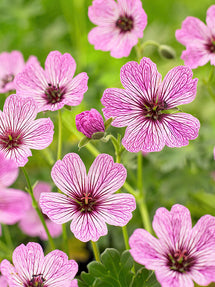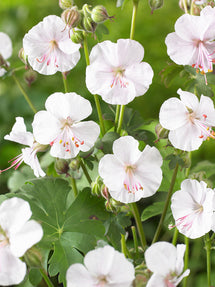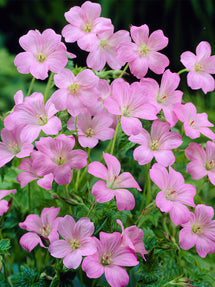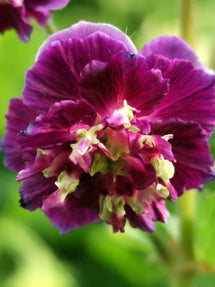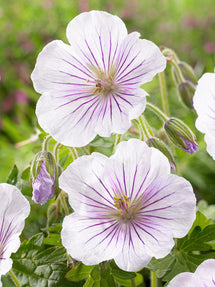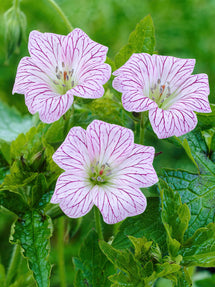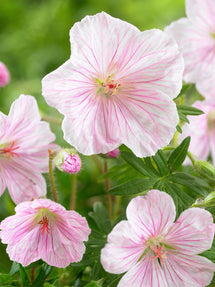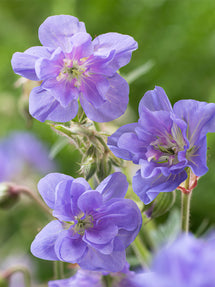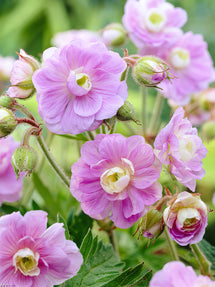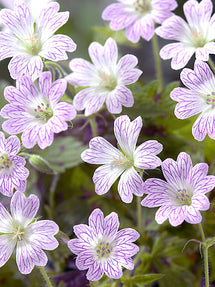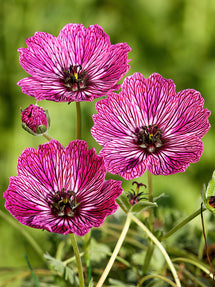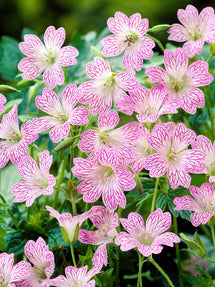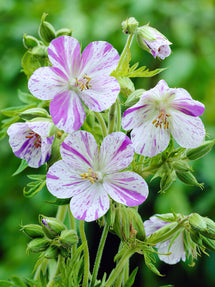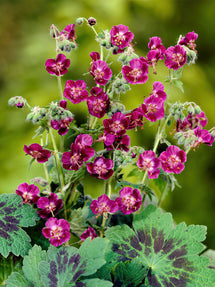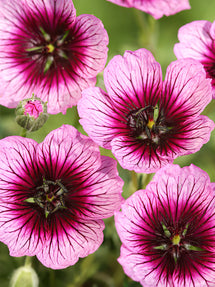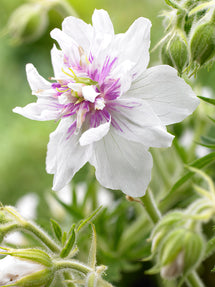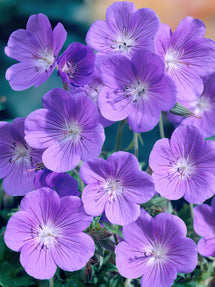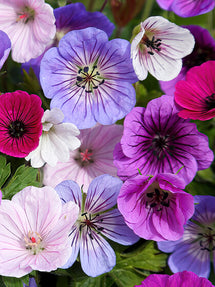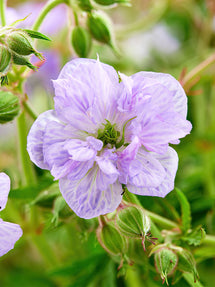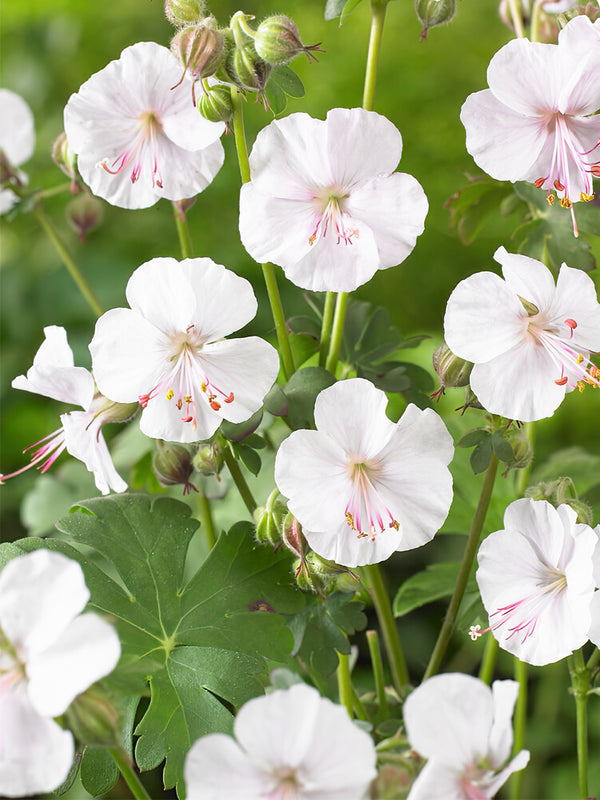Geraniums (Cranesbill)
Beautify Your Borders With The Simple Elegance Of Cranesbills
Renowned for their easygoing nature, striking beauty, and remarkable hardiness, it’s no wonder Cranesbills (Geranium) are cherished by gardeners across the UK. These long-lasting perennials are available in a range of elegant colours, making them a versatile choice for various garden styles, including borders, rock gardens, containers, and as ground cover under trees. Whether you're a beginner or have years of experience, Cranesbills make an ideal addition to your outdoor space from late spring through to late summer.
Explore DutchGrown’s collection of premium Cranesbill bare roots and bring understated charm to your garden.
Showing 1 - 19 in 19 items
Geranium Bare Roots
Cranesbill: A Hardy Geranium With Surprising Characteristics
Cranesbills, part of the Geranium genus, are a group of (mostly hardy) perennial plants celebrated for their resilience, low-maintenance nature, and charming blooms. They typically produce five-petalled flowers, often adorned with fine veining or striking colour variations, in delightful shades of pink, blue, purple, and white. Depending on the variety, Geranium flower shrubs bloom from late spring to late summer, and even to early autumn.
Beyond their charming blooms, the foliage of Geranium Cranesbills offers considerable ornamental appeal. Typically rounded and often lobed or deeply cut, the leaves add texture and visual interest throughout the growing season. Some species also display striking autumn colours, while certain varieties feature pleasantly aromatic foliage.
Cranesbills vary in habit depending on the species. Some varieties make excellent ground covers, while others work well in borders or as specimen plants. With their nectar-rich flowers, they are popular plants for pollinators; they serve as an important feeding station for bees and butterflies.
Charming Varieties That Bring Your Garden To Life
Cranesbill Geraniums are available in an impressive range of varieties, colours, and sizes, each offering unique charm and garden performance. Among the most popular is Geranium ‘Rozanne’, renowned for its exceptionally long flowering period and vibrant violet-blue blooms. Another favourite is Geranium ‘Pratense’ (commonly known as Meadow Cranesbill), which produces clusters of large blue or violet flowers during summer. Geranium ‘Johnson’s Blue’ delivers clear, sky-blue flowers. If you’re seeking bolder tones, Geranium ‘BullsEye Mix’ adds pink or purple tones to beds and borders. Each variety brings something unique and dependable to your garden.
The appeal of Cranesbills goes well beyond their flowers. Many varieties feature delicately scented foliage, releasing subtle notes of citrus, mint, or spice when gently brushed. This small detail brings added depth to your garden experience.
How To Plant Cranesbills For Maximum Effect Outdoors
Planting Cranesbill Geraniums is straightforward, and they offer enduring beauty with very little maintenance. You can plant bare roots directly into borders, patio containers, or in temporary pots before transferring them later in the season. Follow the steps below to achieve the best results in your garden.
Begin planting in spring, once the risk of frost has passed. Select a sunny location, although Cranesbills will tolerate partial shade (dappled sunlight). Use well-drained, moderately fertile soil and mulch to suppress weeds. If using pots or containers, ensure they have drainage holes to avoid waterlogging.
Next, soak the roots in water for 3 to 6 hours to enhance moisture absorption. Dig planting holes and place the roots into dry soil. Position the crown just below the surface, ensuring that the growing tips remain above soil level. Space the bare roots approximately 18 to 28 centimetres apart to allow for good air circulation and to prevent overcrowding. Cover with soil and water thoroughly to help settle the soil around the roots. Keep the soil consistently moist during the first growing season.
Once established, Cranesbills require minimal care and often tolerate dry conditions. Here are some aftercare tips:
- Regularly remove spent flowers to encourage repeat blooming and prevent unwanted self-seeding. However, some gardeners leave seed heads in place for natural self-seeding.
- Divide the plants every few years to rejuvenate growth and prevent overcrowding.
- Trim back the stems in midsummer after flowering to promote a potential second flush of blooms later in the season.
- Some varieties may be more tender and benefit from protection in colder areas.
With just a little care, these reliable perennials will continue to thrive and enhance your garden for many seasons to come. Need further guidance? Follow the maintenance advice in our growing guide ‘How to Grow Geraniums’.
Explore A Wide Range Of Delicate Cranesbills For Sale At DutchGrown
Ready to add Cranesbill to your garden? DutchGrown offers an exceptional selection of your favourite varieties. With a broad range of colours and forms, you’re sure to find the perfect fit for any part of your garden, from borders to containers. Choose the cheerful Geranium ‘Splish Splash’ with its playful markings, or opt for the distinctive Geranium ‘Phaeum Joseph Green’ for a touch of understated elegance. Each variety is carefully selected to ensure you receive only the highest-quality bare roots. Explore our Cranesbill collection and grow with us. We deliver throughout the UK.
Frequently Asked Questions About Cranesbills
Do Cranesbills Prefer Sun Or Shade?
Cranesbill Geraniums thrive in full sun, where they produce the most abundant blooms and maintain a neat, compact growth habit. They are normally grown in part shade to full sun, but too much shade may result in fewer flowers and leggy growth.
What Is The Difference Between Geranium And Cranesbill?
Cranesbills are hardy perennial plants belonging to the Geranium genus. They're not the same as annual Geraniums, which belong to Pelargonium. True Geraniums (Cranesbills) are valued for their vigour, resilience, and extended flowering period. They have a softer, more natural appearance, with finely cut foliage.
Does Cranesbill Geranium Spread?
Cranesbill Geraniums can spread gradually over time. Many varieties form generous clumps, and some may self-seed if spent flowers are not removed. This makes them excellent for filling gaps or achieving a natural look in borders. To keep plants healthy and prevent overcrowding, it's advisable to divide them every few years. Deadheading can also help control unwanted spreading and encourage more blooms.
Is Cranesbill Geranium Invasive?
Cranesbill Geraniums are not generally considered invasive in garden settings. They spread moderately and are easily managed with occasional deadheading or division. When planted in suitable conditions and cared for properly, most hardy Cranesbills are well-behaved perennials.
